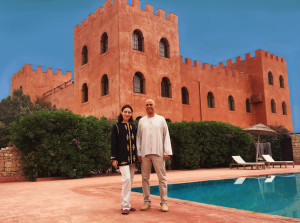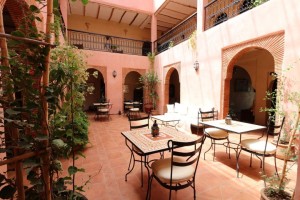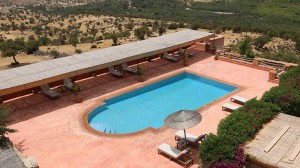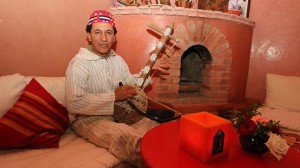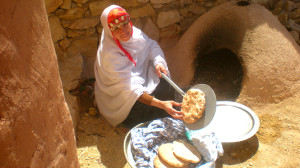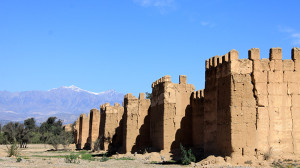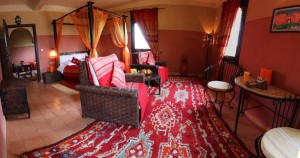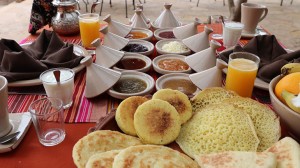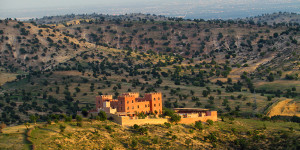Editor’s note: I traveled around Morocco with my daughter in 2006 and found the people, cities, and culture to be both welcoming and exotic. When the Atlas Kasbah Ecolodge joined our community of ecolodges and I read about their accomplishments, I knew it would make an interesting addition to our growing list of interviews.
Hassan and Helene, I’ve found that many ecolodges owners have solid educational backgrounds in fields such as EcoTourism, Environmental Education, Sustainable Development, or other related fields, but I don’t think I’ve found anyone with the background that the two of you have. Hassan, you hold a Ph. D. in Sustainable Development, and Helene, your Masters Degree in that same field. What was it in your background that brought the two of you into sustainable development, and how has this influenced the development of the Atlas Kasbah Ecolodge?
Hassan: Here in Southern Morocco, the Berber communities have always been recycling–reusing everything. My mom is actually an expert in that! Nothing is wasted. Thus, from the right beginning, I was brought up in a sustainable environment. When I studied tourism for my bachelor’s degree, I was naturally interested in sustainable tourism and it became my major in both my Master’s and Ph.D. degrees. The Atlas Kasbah Ecolodge was created as part of our life philosophy. We wanted the best possible quality of life for our guests, our team and our family.
Helene: I have always been interested in natural remedies, using local plants for curing myself. Then, after extensive research within this field, I became interested in eco-friendly products from makeup to organic food. So in 2005, I decided to major in sustainable development for my Master’s degree.
Since your opening in 2009, you’ve collected a large number of awards, including the “Responsible Tourism Award” from Morocco’s Ministry of Tourism, the “International Green Key Eco-label” from the King Mohamed VI Foundation for the Environment, the “ALM Ecology Trophy” from the International Network of Responsible Tourism, and probably your most prestigious award, the first and only accommodation in North Africa to be granted the “World Responsible Tourism Award” (WRTA). What is your secret to amassing all of these achievements?
Hassan: We are very proud for these achievements, proud of our team, proud of all the Berber communities that live in the nearby villages and produce organic food for us, and for all of the local, regional and even national stakeholders that have helped us along the way. So, to obtain these awards, we worked within a participative framework and shared values that are important for us. We love what we do and believe in sustainability.
Helene: As for the WRTA, what is being said is that we are the first French-speaking facility to have won, so that’s something and it’s a great promotion for the Kingdom of Morocco as a green destination. Overall, the WRTA was definitely the hardest one we have ever applied for and not only because it was in English!
Hassan: That’s true—the application process was very hard and it took a long to prepare. The greatest challenge in these awards is for us to find the time to prepare them! We often work on them late at night after attending to our guests, checking the bookings, and taking care of our three children. I also work as a sustainable tourism consultant, so extra time can be hard to find.
Your location within the Argan Biosphere Reserve, a UNESCO World Heritage area in the High Atlas Mountains, must be a fairly pristine location. Can you describe what that environment is like?
Helene: We are located within the argan forest, which is only 20 minutes from the city of Agadir, the beach, and the airport, but far enough away to feel completely disconnected from the world! That’s why we have chosen to live here. It is at the top of a hill overlooking a green valley and Berber villages. We are also only 10 minutes by foot from a women’s cooperative of argan oil.
Hassan: And historically speaking, the road used to be for the caravans going from Timbuktu to Europe, as it was the only practicable path in the Atlas Mountains back then and there used to be a river for the dromedaries to drink.
I see on your website that your helpers come from Berber communities. I’ve heard of Berber communities, but I don’t really know what that means. I’ve traveled in Morocco before, but only to the larger cities. Are these people different than the other Moroccans I met in Marrakesh, Fez, or Casablanca?
Hassan: The Berbers are also called ‘Amazighs’ which means “Free men”. They are the native community in Morocco but throughout history, Berber and Arabic people have mixed. So, the Moroccan identity involves the harmonious combination of both cultures as well as the culture from Sub-Saharan Africa.
In the 2004 national census, there were up to 62% of Berber natives in Morocco. They have many traditions in common with the Arabic people and also many differences. For example, the language is completely different as we speak dialects. The Berbers also write from left to right, not like in Arabic. Agadir is the Berber capital of Morocco but you can find Berbers all over the Kingdom.
You have a lot of activities that your guests can indulge in–beauty and wellness, bird watching, cooking classes, and pottery making to name just a few. What have been some of the more popular activities, or ones that you’re most proud of?
Helene : The most popular activities are definitely the Moroccan steam-bath, the “hammam”, the argan oil massage, and the yoga. The cooking classes are also quite popular among people that don’t reside in the ecolodge. For the tadelakt (waterproof plaster) course, people would stay for a week to learn it and do it on the walls of their bathroom back home. During spring, bird watching is the number one activity that we organize.
Hassan: All of these activities enable an interaction with the locals and that is really important. We also offer a hike with a local inhabitant Ahmed who doesn’t speak anything but Berber and Arabic. All the guests manage to understand him and he perfectly understands them thanks to non-verbal communication by using gestures and laughing—it’s amazing. The guests pay him directly so he has revenue throughout the year. Thanks to the ecolodge, we directly and indirectly help many families from the village.
You also have opportunities for your guests to engage in cultural daytrips from your lodge, including the Souss Massa National Park, Marrakesh, Berber villages, and fishing villages to name a few. Do most of your guests take advantage of these tours, or do you find most guests just stay in the Kasbah and relax?
Hassan: This really depends. Some guests love to move around and discover and other guests prefer to stay for one week in the Kasbah enjoying the activities that we offer. But what we see is more and more stressed people coming to wind down.
Helene: Yes, I remember there was this man who was staying with us for a week, he would come to the reception area to check his emails 10 times a day on the first day of his arrival. The second day, he came only half of the times, after that, he never came back to check his emails. At the end of his stay, he explained to us that he had managed to disconnect from his work for the first time ever and was thrilled.
You have eleven rooms in your complex. Can you describe what visitors can expect to find in your accommodations? Do the accommodations reflect the Berber culture?
Hassan: Our accommodations have Berber decoration and traditional furniture, along with comfort that meets international standards. We won the Heritage Award in 2012 for promoting local heritage in our ecolodge. We also use both solar and national electricity so the guests can choose the one they want to use and the water is 100% solar heated. And all of our rooms offer a panoramic view on the argan forest.
Helene: The bathroom amenities are also natural and made by Moroccan women from the olive soap to the black soap. We also offer orange blossom water, natural shampoo and some ‘ghassool’, the Moroccan black clay that women use here as a shampoo and as a body mask. To promote the Moroccan handicraft, we have prepared a quiz that is available in the booklets in the room and it helps to promote the work of the local cooperatives.
You must serve great Moroccan food at your ecolodge, which I’ve found to be some of the best in the world. What menu items do your guests enjoy the most?
Hassan: Well, couscous is famous all over the world so people love it and they have the opportunity to discover an organic semolina here that is made with five different cereals by women in cooperatives from Southern Morocco. It’s also suitable for vegetarian diets and as we have many vegetarian people here, they love it ! Also tajines (a North African dish named after the earthenware pot in which it is cooked) are very popular among our guests.
Helene : Yes, people love the beef with prunes and sesame ones or also the chicken with raisins and preserved lemons. Once they have tasted them, they sign up for the cookery class to learn how to make a authentic traditional one.
For more information on the Atlas Kasbah Ecolodge, visit their website at http://atlaskasbah.com/en/




